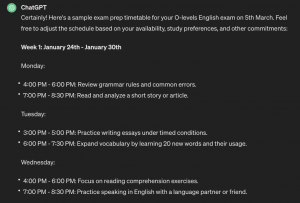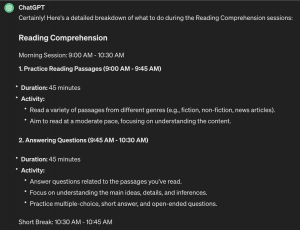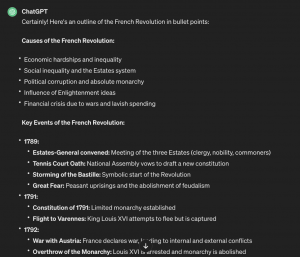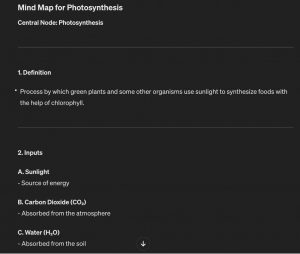
[Freepik: freepik]
What is the worst thing about exams?
The perceived difficulty of a test? Time management skills? Or, trying to remember everything you learned?
Actually, for most students, the anxiety in the days leading up to the exam is worse than the actual exam itself.
Of course, exam preparation can be demanding and hectic. However, planning exam prep can be even more challenging, especially when managing the dates, revision schedules, and practice tests all by yourself.
But not anymore.
With the help of artificial intelligence (AI), students can now plan their exam prep seamlessly, and in considerably less time. Wondering how? Let’s tell you how.
How to Use AI Chat Tools for Exam Prep
Now that we have covered the key benefits of using AI for exam prep, let’s get into how you can maximise these benefits.
Build an Exam Study Plan
Are you someone who absolutely hates creating timetables for exam prep? Then artificial intelligence can save you considerable time.
For instance, let’s say you are using a free AI tool like ChatGPT. You only have to share your exam timetable with ChatGPT and prompt it to create a study plan. The AI study tool will create a comprehensive study plan for you right away.
Then, based on your preferences, you could ask ChatGPT to make adjustments. To elaborate, you might prefer to study at night rather than in the morning. By including this detail in the prompt, ChatGPT will suggest a study schedule that works best for you.
The prompt could be as follows:
‘I have my O-level English exam in four weeks. I prefer to study for six hours each day, spread throughout the day with sufficient breaks. Also, provide an overview of topics and subtopics to study every day.’
Below is a short glimpse of the study plan generated by ChatGPT for the same prompt.

[ChatGPT]
As you can see, ChatGPT has clearly broken down the hours for studying as well as for breaks. Moreover, it clearly states how you can approach the exam to cover all topics.
It is up to you to make additional changes, or prompt ChatGPT to include more information depending on your unique needs.
For example, you could ask ChatGPT to offer more information on what you should cover during reading comprehension, such as ‘Break down what to do during reading comprehension’. The tool will consequently generate something as follows:

Similarly, you can also ask ChatGPT to provide you with a reading list or come up with examples for news articles.
This is only one case of using AI with a chat-based tool. There are other dedicated AI studying apps such as Quizlet that come with in-built features to create your own study plan, at your own pace.
Create Outlines and Summaries
After creating an exam plan, it is then time to move on to the actual studying part. With AI, you need not have to go through the full study materials to understand the key points. Instead, we can also use AI tools creatively for learning. For instance, creating summaries of complex information will let you identify the key concepts easily.
To give an example, let’s say you are trying to learn about the French Revolution. Of course, learning the key events and dates can be quite a hassle. In this case, you can use an AI-based tool, like ChatGPT to provide you with a content summary.
Let’s say you type in:
‘Provide me an outline of the French Revolution in bullet points’.
ChatGPT will instantly provide you with an outline that is easier to understand, as you can see below.

[ChatGPT]
This way, you don’t have to tackle long paragraphs to find out important points. Such AI tools can efficiently break down study materials into smaller parts.
You can also copy-paste a paragraph from your textbook and ask the AI tool to create a summary for you,
Needless to say, this can make exam prep less time-consuming for you.
Create and Practise With Flashcards
Another way to approach exam prep is to use flashcards and mindmaps. These are great tools for visual learners to study effectively.
But, during exam prep, you’re likely to be strapped for time to make them yourself. That’s why many students now search for how to make a flashcard using AI tools.

[Freepik: benzoix]
One popular AI-based app for flashcards is Quizlet. With this app, you can create flashcards on your own using text or images. Quizlet also comes with a study mode where it presents the flashcards in a variety of formats (e.g., multiple-choice, true/false) to help you memorise the terms and definitions. You can also access and learn from the flashcards created by other Quizlet users.
Some of the other popular AI-based flashcard apps include RemNote, Anki, Brainscape, and Memrise.
But what if you don’t want to download an app? No problem there either.
If you have blank cards with you, you can ask AI chat tools like ChatGPT to offer you the content. For instance, you can ask the tool to create a flashcard for English vocabulary, and the tool will come up with one right away.
Work with Mind Maps
If you are not so keen on flashcards, then mind maps are another way AI can help speed up your exam prep. For this, you can choose an AI tool such as ChatGPT, or use a dedicated app.
If you are using ChatGPT, it will generate text that could go on a mindmap. For example, you could prompt ChatGPT to help you create a mind map for photosynthesis and the tool will come up with text as follows.

You can then refer to these to create your mindmap format or use AI apps such as MindMeister or Lucidchart. These apps also allow you to customise the mind map designs.
It’s all about finding the right method that works best for you. As we discussed already, AI tools are equipped to offer highly customised study tricks, meeting all your unique demands.
Come Up with Practice and Revision Tests
AI tools can also come up with practice tests to help you revise effectively. For instance, let’s say you are revising for a big chemistry exam. You can start a chat session with an AI chatbot and ask for practice questions on specific topics.
AI chatbots such as ChatGPT can also generate questions in multiple formats, including multiple-choice, fill-in-the-blanks, short-answer questions, and more. Furthermore, AI tools can even throw essay questions at you, in order to test your knowledge.

[Freepik: jcomp]
Moreover, AI can also help you take mock tests in a timed environment. This will equip you to manage your time effectively during your exams.
And once you write down the answers, the tool can also check them and correct them for you. In case you need additional help, these tools can explain the answer in detail, breaking down those tricky concepts step by step. This can be especially used for subjects such as mathematics.
Help You Stay Motivated
AI tools these days can also keep you motivated during your study journey. To give you an idea, AI apps can track how much you are interacting with the study tool every day. This way, it will send you notifications and messages, encouraging you to stay consistent.

[Freepik: tirachardz]
Whether it’s reminding you to review your notes, complete practice exercises, or take a well-deserved break, AI apps can provide timely encouragement to help you stay on track. This will help you make the most of your study sessions.
Moreover, these messages would also be personalised and tailored to your progress and goals. This will ultimately ensure that you remain focused, motivated, and ultimately successful in reaching your academic aspirations.
Is Using AI Tools For Exam Prep Allowed In Schools?
So, we have established that AI can be an incredibly useful tool for exam prep. But, what do educational institutions think of this option?
Surprisingly, the Ministry of Education in Singapore has adopted a friendly stance towards integrating artificial intelligence in schools. As part of MOE’s Transforming Education Through Technology (EdTech) Masterplan 2030, various initiatives are being implemented to make students more adaptive and creative.
Many schools have also taken steps to use artificial intelligence to help students with exam prep. For instance, at Lakeside Primary School, students are using an AI-based technology called the Adaptive Learning System (ALS) to receive personalised recommendations based on their responses to questions.
This system allows students to receive immediate feedback and adapt assignments to their level of understanding, making learning more engaging and flexible. Teachers have noted that this approach prevents students from feeling they are wasting time when they encounter challenging questions and helps them ace their exams.

[Freepik: jcomp]
Not only in schools, universities are also embracing AI. Since 2023, university students have been given the green light to use artificial intelligence tools for their assignments. The Singapore Institute of Technology, for example, encourages students to use generative AI as a tool rather than a primary source of information. Generative AI, like ChatGPT and Sora, can create content such as text, images, and videos based on user prompts.
However, schools and universities made it clear that using AI doesn’t mean students can slack off or bypass the rules. They still need to think independently and deeply engage with their course material.
It’s not just about using AI; it’s about using it responsibly and ethically. Schools are keen on teaching students the correct way to use AI tools, ensuring they can effectively leverage these technologies both in their studies and future careers.
So, what should students consider when using AI for exam prep? We discuss more on this below.
What to Consider Before Using AI for Exam Prep
Earlier in the guide, we included a disclaimer on how AI can also have some downsides for students. In this section, we will take a closer look at what you need to be aware of when relying on artificial intelligence for studying.
Over Reliance on AI
While artificial intelligence has many advantages, one major concern when using AI is overreliance on this technology. In fact, experts think that using too much technology to study could potentially diminish students’ critical thinking and problem-solving skills.
Moreover, students who heavily depend on AI might find themselves less adept at independently analysing complex concepts or tackling unfamiliar challenges.

[Freepik: mindandi]
For instance, earlier we gave an example of how AI can generate content summaries and outlines almost instantly. However, if a student always uses AI to study, throughout the school year, it could hinder their ability to develop their own interpretations.
In fact, with this in mind, the Ministry of Education in Singapore has even developed an AI-in-Education (AIEd) Ethics Framework to ensure responsible usage of artificial intelligence in edtech.
Quality of Content
When it comes to AI, one of the most commonly raised questions is whether this technology would replace teachers. Well, the answer is no, at least for the moment.
This is primarily because you cannot always verify the quality of content provided by the AI tool. Unlike teachers who can curate and tailor content based on their expertise and experience, AI-generated content may lack depth, accuracy, or relevance.
Additionally, verifying the quality of AI-generated content can be challenging and time-consuming – which would not be wise during exam prep.
So, if you are in dire need of help with exam prep, you might want to consider working with a private tutor.
Limited Subject Coverage
Unfortunately, while AI can be super helpful, it’s definitely not omniscient. AI tools are programmed with a set of databases, which means they might not have comprehensive coverage of every subject or topic.
So, if you’re relying solely on AI for your exam prep, you might end up missing out on key information that could show up on the test.

[Freepik: jcomp]
For instance, imagine preparing for a history test using AI, and the tool fails to include summaries of some events. Maybe you’re preparing for a science exam, and your AI tool doesn’t delve deep into a particular concept that ends up being a major part of the test. This could be a serious issue, which could affect your overall understanding of the subject.
Limited Adaptability
AI tools indeed offer customization to a certain level. That being said, ultimately, these tools are programmed with algorithms that follow a specific structure and pace. Meaning, they may not always adapt quickly enough to your changing needs and progress. This could lead to a lack of adaptability and can result in gaps in your understanding and preparation for the exam.
We will elaborate on this a bit more. Let’s assume you’re struggling with algebraic equations. A rigid AI study tool might only offer a few practice questions on the topic and then move on to the next subject.
Without additional support and adaptability to focus more on this challenging area, you might not get the practice you need to master the topic, which could further affect your performance on the exam.
Lack of Context
Crucially, artificial intelligence lacks the ability to contextualise information and provide real-world examples or applications. For instance, when studying a historical event, a full-time teacher might provide insights into the socio-political climate of the time, the motivations of key figures, and the event’s long-term impact.
In contrast, AI may present the facts without placing them within the broader historical or cultural context, making it harder for students to grasp the significance and relevance of the information.
What’s the Verdict? – Should you use AI Tools for Exam Prep
Well, at the end of the day, it’s all about striking a balance. While AI can be a fantastic study aid, it’s important to supplement it with other resources like textbooks, lecture notes, and, of course, good old-fashioned guidance from teachers and tutors.
By taking advantage of all these resources, you can ensure that you’re getting a well-rounded understanding of the subject and covering all your bases for the exam.
If you are looking for an effective tutor to help with your studies, you can find tutors here.
Disclaimer: While AI tools can enhance exam preparation, overreliance may hinder the development of essential study skills and critical thinking. It is advisable to use AI as a supplement to traditional study methods for a well-rounded approach.
